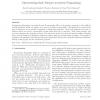Free Online Productivity Tools
i2Speak
i2Symbol
i2OCR
iTex2Img
iWeb2Print
iWeb2Shot
i2Type
iPdf2Split
iPdf2Merge
i2Bopomofo
i2Arabic
i2Style
i2Image
i2PDF
iLatex2Rtf
Sci2ools
144
click to vote
FGCS
2010
2010
Characterizing fault tolerance in genetic programming
Evolutionary Algorithms, including Genetic Programming (GP), are frequently employed to solve difficult real-life problems, which can require up to days or months of computation. An approach for reducing the time-to-solution is to use parallel computing on distributed platforms. Large such platforms are prone to failures, which can even be commonplace events rather than rare occurrences. Thus, fault tolerance and recovery techniques are typically necessary. The aim of this article is to show the inherent ability of Parallel GP to tolerate failures in distributed platforms without using any fault-tolerant technique. This ability is quantified via simulation experiments performed using failure traces from real-world distributed platforms, namely, desktop grids, for two well-known problems. Key words: Fault-tolerance, Parallel Genetic Programming, Desktop Grids.
Related Content
| Added | 25 Jan 2011 |
| Updated | 25 Jan 2011 |
| Type | Journal |
| Year | 2010 |
| Where | FGCS |
| Authors | Daniel Lombraña Gonzalez, Francisco Fernández de Vega, Henri Casanova |
Comments (0)

